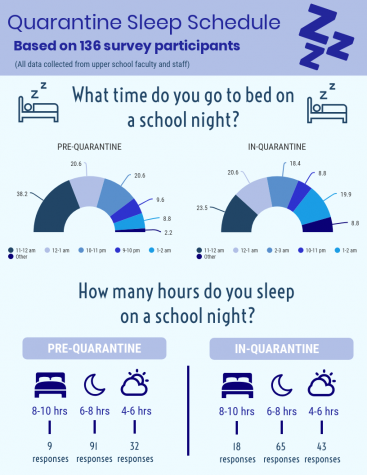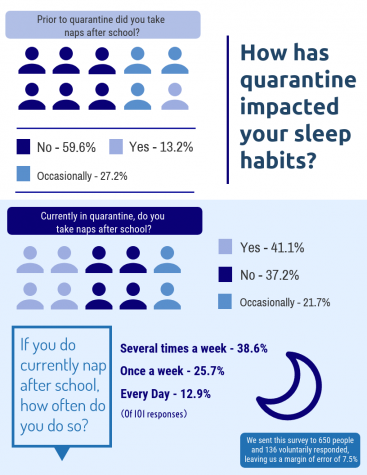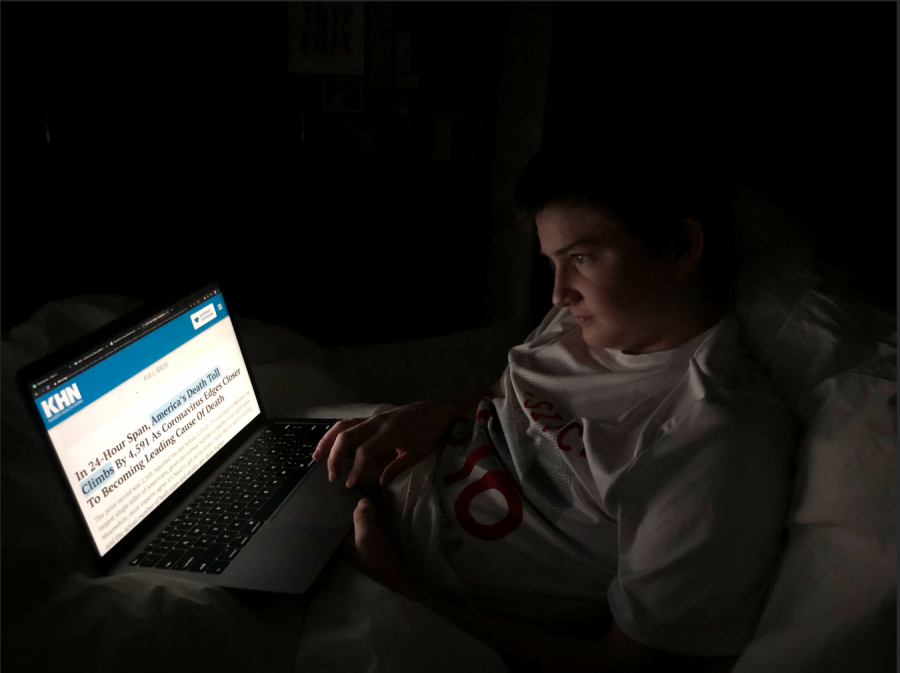Quarantine has dramatically altered our sleep schedules
The effects of staring at a screen throughout the day, combined with the constant bombardment of coronavirus-related news has made it increasingly difficult for students and faculty to maintain a normal sleep schedule.
May 2, 2020
The anxiety of living through a global health crisis coupled with the increased flexibility within our daily schedules is changing sleep habits. Insomnia, or the general inability to fall asleep, is not uncommon, and is usually a short-lived issue, but, for many, living right now in a world shrouded in fear and uncertainty means that they find themselves lying in bed at night, incapable of sleep.
Dr. Josh King is a New York city based specialist in Cognitive Behavioral Therapy for Insomnia (CBTI), with a focus on mindfulness and changing the thoughts and behaviors that cause immediate distress. He said that he has observed a clear link between stress that is specifically related to coronavirus pandemic and an increase in occurrences of acute insomnia.
“It’s been 100 years since we’ve had anything like this related to an illness, and the only other time that we’ve had anything that was scary in this way was 80 years ago during World War II, but even then you were encouraged to go and spend time with family. The ultimate result of this unprecedented feeling is that you’re scared and anxious and you’re not going to sleep well,” he said.
As an increasing amount of people are forced to fulfill their duties at work or school through online platforms, the pressure to sleep builds up from sitting in front of a screen all day, ultimately causing people to take late afternoon naps or doze off in front of the computer. This pre-nighttime sleep is yet another disturbance to a regular sleep schedule.
King said, “Insomnia starts from that acute moment of stress and then it’s the behaviors that come around it that causes it to be something that’s long lasting.”
One of these behaviors could start out as simply going to watch some TV in your living room one night because you can’t get to sleep, but could progress to a point where you are only able to fall asleep if you are on your couch, watching TV into the early hours of the morning.
Sophomore Phoebe Radke said that she has found herself slowly shifting her bedtime later into the night as her time spent in quarantine has progressed.
Radke said, “Before quarantine I usually would try to go to sleep around 10 o’clock at night, but since quarantine started I thought, ‘Well, even if I go to bed at midnight, I still have eight hours’; so I started going to bed later, and later and eventually, even if I tried going to bed around 10, I couldn’t.”
Napping has also become a major side effect of remote learning and altered sleep schedules. Exhaustion from sitting in front of a laptop screen all day has caused some people to regularly take naps after school, making them less tired when they would normally go to sleep so that they end up going to bed later and the cycle continues.
Sophomore Stella Zinaman has observed herself falling into this very cycle.
She commented, “I used to be really good about sleep, going to bed at 10 or even sometimes as early as eight on a school night, but now I stay up until one every night and I take naps in between classes. So I have a lot more time to sleep during the day, but then because I nap during the day I stay up later because I can’t get to bed at night.”
Radke also said that although she had never been one to nap, in the beginning of the transition to online learning she would try to nap with the sole intention of resting her eyes, which she said “burned” from staring at a screen all day.
For faculty members as well, fatigue from sitting at their computers all day has dramatically increased.
Upper School English teacher Paul West said, “I’m exhausted after a day on the screen. It struck me as a real irony because I thought, ‘Oh this will be chill, I’ll sit back in a chair, I’ll have comfortable clothes, a cup of tea’, and it’s been nothing like that.”


For some, however, the emotional toll of living through a pandemic has been the most potent source of detriment to their sleep habits.
Upper School science teacher Elisabeth Merrill has found that she gets little to no sleep, and often ends up dealing with a lot of her own anxieties about our global situation.
“I find that when I lay down I go through all of the ‘what if’ scenarios, I just worry what would happen if I died and what would happen to my kids, and I worry about other people,” Merrill said.
As the situation elevated to a state of national emergency, and unemployment began to soar, Merrill said she found herself awake worrying about the most vulnerable members in our society, who have been forced to choose between putting themselves at risk to exposure, or losing vital income.
“It’s just really hard because now we see that half of America is one paycheck away from disaster. But I’m also overwhelmed with gratitude for my own job and safety,” Merrill said.
West said he would often get sucked into the constant stream of coronavirus-related news and that is what would push back his bedtime.
While no sleep aid will completely relieve people of their coronavirus worries, King suggests that those struggling with sleep alter their schedule in an effort to return to some level of normalcy while stuck at home.
He commented, “I would say that you should try to sleep a little bit less to keep your same wake time as if you were going to work or school and try to stay up a little bit later so that you’re more tired during the day and that’s going to help build up the pressure to sleep at night.”






Shelley • May 2, 2020 at 7:01 PM
Very informative and great writing.